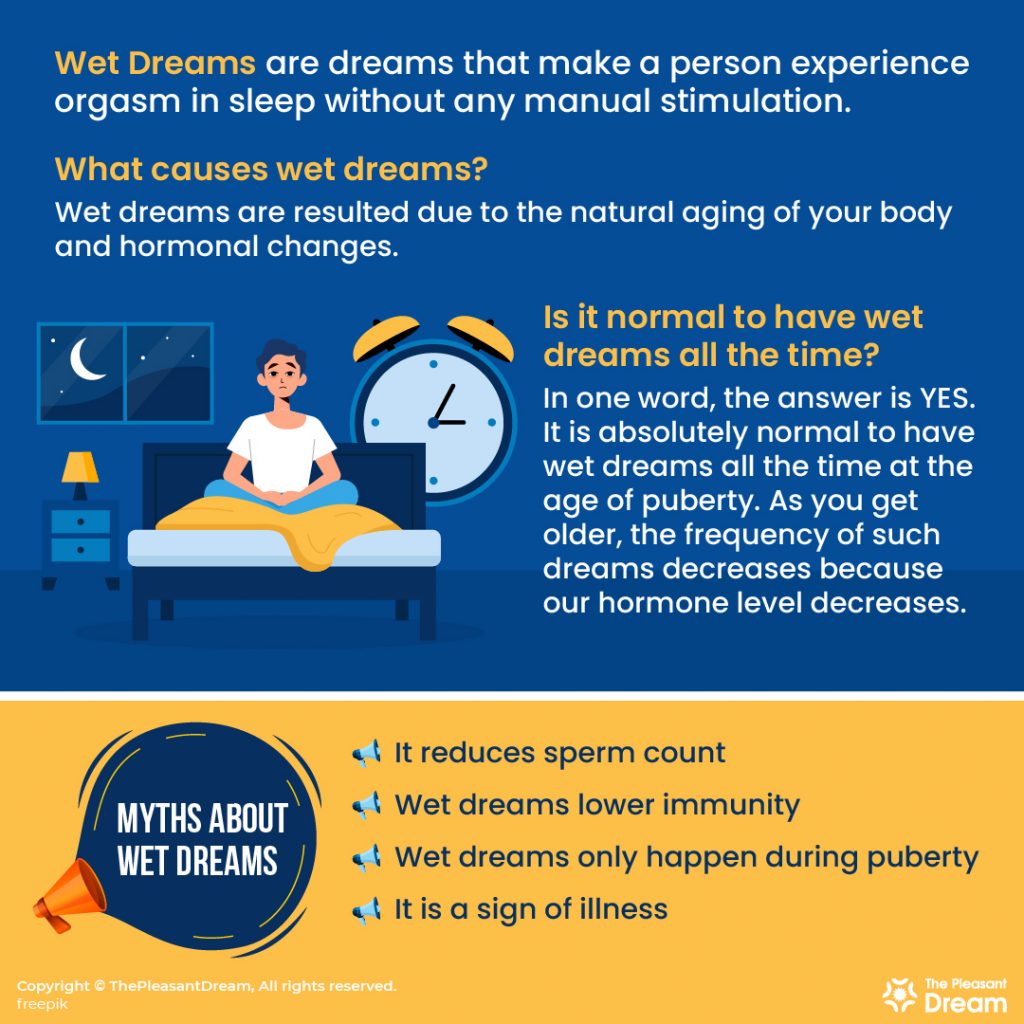It is a common belief that teenage boys experience more wet dreams than the rest of the age groups. But this belief is only partially true. Sleep orgasms, also called wet dreams, are a part of growing up. They are equally common for any gender at any age following puberty.
When wet dreams occur for the very first time, you might be shocked or embarrassed. But this is only because you haven’t spoken to others regarding it.

What is a Wet Dream?
In simple words, wet dreams are dreams that make a person experience orgasms in sleep. This dream can or cannot be erotic. These orgasms are involuntary or without the cause of masturbation or manual stimulation.
When males see such dreams, they wake up with wet pants, wet underwear and sometimes wet bedding too. This is a result of the ejaculation of semen, the fluid containing sperm from a man’s body.
Similarly, when females experience a wet dream, they find their vaginas lubricated resulting in orgasms during sleep. To sum up, we can also say that wet dreams cause you to secrete vaginal fluids.
Why Do Wet Dreams Happen?
Wet dreams occur because, at the age of puberty, our body undergoes some physical and emotional changes. The body starts to produce more sex hormones increasing the desire for sex.
For men, the sperms are produced whereas the women produce eggs. In this period, the genitals grow and we can spot facial and pubic hair.
When Does Someone Start Having Wet Dreams?
A person starts having wet dreams when he/she enters puberty. This occurs majorly among teenage boys when puberty strikes and they have the capability to produce sperms at their climax. This is because of higher levels of testosterone at puberty.
Even 70% of unmarried men or men of the age group of 21-25 years experience these dreams with different frequencies. Along with teenagers, adult men also get these dreams.
You’ll find people experiencing these dreams until they are in their reproductive age i.e., from puberty till they enter their 30s.
How Often Do You Have Wet Dreams?
Every person is different and so are their dream patterns. While you can’t quote any distinct number, here’s some production backed with scientific studies.
In males
Studies suggest that if you have been astray for sex for a period of 1-2 weeks, with no masturbating or having sex, there are high chances you may experience wet dreams.
In Indonesia, studies have concluded that 97% of men experience wet dreams by the time they turn 24 years old. It is believed that males, who have a greater number of wet dreams, masturbate less.
In females
Sex researcher, Alfred Kinsey concluded that approximately 40% of women who participated in his study had experienced wet dreams at least once.
It is believed that by the age of 21, 85% of women have experienced at least one wet dream. However, it is easier to identify such dreams among men than in women.
What to Do When You Have a Wet Dream?
For men just hitting the age of puberty, these wet dreams might feel embarrassing – but let me tell, it is very common. So, if you have one, just wake up, go to the bathroom and clean yourself. Wash your penis, testicles, and the area under the foreskin with soap and water.
There is nothing to be ashamed of such dreams. But if you are, seek medical advice from a doctor. Talk to a therapist or an adult or a friend who has your full confidence.
How to Stop Wet Dreams?
The best way to decrease the frequency of wet dreams is to have sex or to masturbate. The chances of wet dreams decrease when one has an orgasm in real life (followed by ejaculation in men).
You can also reduce contact with things surrounding you with your genitals so that there is no stimulus around to provoke them. Try sleeping on your back instead of your stomach.
You can take antidepressants after speaking to a doctor to avoid such dreams. Meditate before going to bed and avoid watching porn or reading sexual content as it may remain fresh in your mind leading to wet dreams.
How to Have a Wet Dream?
Having or preventing a wet dream is under nobody’s control. But the experts say there are certain things you can try to raise your chances.
First, read a little erotica and get yourself in the mood. This might help you get sexual dreams.
Second, imagine sex. If a person has regular positive thoughts on sex, the chances of sex drive during REM sleep increases. This makes it easier to get wet dreams.
Next, you can also try sleeping on your stomach to create some stimulation to increase your blood flow towards your genitals. This can result in sleep orgasms.
Myths about Wet Dreams
Wet Dreams has a lot of myths attached to it and since “sex” is such a hush-hush topic, it is not even confronted. So, here’s busting some of the most common myths around wet dreams.
1. It reduces sperm count
It is an absolute myth to believe that wet dreams reduce sperm counts. Instead, the fact is that wet dreams allow testicles to replace older sperm with new, sexual, and healthy sperm in the body.
2. Wet dreams lower immunity
Wet dreams do not result in lower immunity. People believe that if the frequency of wet dreams is more in a person, they are more prone to cold or infection. But there’s no evidence for this.
3. Wet dreams only happen during puberty
Wet dreams are not only limited to puberty. They can occur in older individuals as well. The reason it is more common in puberty is that in adults, the hormone levels are consistent.
However, at the age of adolescence, these hormonal levels are constantly changing, resulting in more wet dreams.
4. It is a sign of an illness
Wet dreams aren’t any sign of illness or underlying medical conditions. Instead, it’s absolutely vice versa. When wet dreams occur, it means you have healthy and sexual functioning.
5. Masturbation prevents wet dreams
If you think masturbating before sleeping can prevent wet dreams, then there’s no solid evidence for this statement. It is a possibility that masturbation can reduce the frequency of wet dreams but it certainly cannot prevent such dreams.
6. Wet dreams shrink penis
Again, the shrinkage of penis because of wet dreams is a total myth. Science does not back this up. The male reproductive organs cannot shrink because of any illness or natural occurrences.
7. Wet dreams are always erotic dreams
There is no compulsion that wet dreams are always erotic. One can experience sexual arousal from a non-erotic dream too. Arousal is also possible through stimulation because of friction with a bed.
8. Positions don’t matter
For erotic or wet dreams, positions matter. Just like you feel stimulated at a certain posture while having sex, so is with sleep.
If you have a habit of sleeping on your stomach, your reproductive part can touch the bed or pillow, providing it a stimulation that results in such erotic dreams.
If you want to avoid such dreams, try sleeping on your back.
9. Friction orgasms are a fad
If you think friction orgasms are a fad, they aren’t. You can get wet because of erotic dreams or because your private part received stimulation through friction from bedding or clothing.
If you don’t want to have such dreams often, sleep in loose pajamas. When you wear baggy clothing, the friction decreases and acts as an obstacle between you and your bedding.
10. Everyone experiences wet dreams
You can get wet dreams as an adolescent or an adult. Probably, you’ll never have one. And whatever the case may be, you don’t have to stress at all because of it.
Can Girls Have Wet Dreams?
To be precise to this question, the answer is YES. Although the term ‘wet dreams’ is commonly used for men, women have reported experiencing wet dreams too.
In fact, a study also reported 37% of adolescent girls experiencing sleep-gasm in dreams. They might not be aware of the vaginal lubrication caused in their sleep because of wet dreams.
They might not experience spontaneous orgasm or wet their undergarments like men. But they definitely dream of sexual activity and sexual arousal in dreams.
FAQs
In one word, the answer is YES. It is absolutely normal to have wet dreams all the time at the age of puberty.
As you get older, the frequency of such dreams decreases because our hormone level decreases. Even if it doesn’t, there’s nothing to stress about. So, irrespective of any age, wet dreams are pretty common.
No. Not always. It is not necessary for the dream to be erotic to result in orgasms. Neither is it necessary that you’ll always have an orgasm because of a sex dream.
Such dreams can be a result of many factors. A common reason is friction between your bedding and your genitals. This can also lead to sexual arousals and orgasms.
Let’s make it clear that it is not easy for everyone to have orgasms. Every person has different needs and levels of satisfaction.
So, if you think you get sleep orgasms often, then you should probably take out time and notice what is so special in your sleep that turns you on. Is there any particular move or position that you like? If yes, implement the same in your real sex life and see if it works for you.
Totally. There’s nothing to panic about if you haven’t had any wet dreams. Not everyone gets such dreams.
There are chances that you may get wet dreams as an adolescent but not as an adult. This is absolutely normal because dreams are personal and different for every individual.
If you want to have a wet dream, this may be possible. Try to sleep on your stomach or any other sexually prone position. The reason behind this is still unclear but you can surely give it a shot.
Yes. “Nocturnal emissions” is the medical jargon or formal name of “wet dreams” and “sleep orgasms”. All three terms mean the same.
Well, not really. Dreams are never under our control. However, some experts indicate that you can do it by influencing your dreams. Try to think of a topic before sleeping or make use of some outside stimulus.
Even if you do this, there is no guarantee that you’ll be able to prevent these dreams successfully.
You might be feeling embarrassed even when these wet dreams are completely common. If you want to reduce your anxiety over the topic, you can talk to your partner. However, If you’re dealing with it calmly, there’s absolutely no need to tell anyone.
Closing Thoughts!
There is nothing to worry about such dreams and you must not allow them to overpower you. You can be experiencing one or multiple wet dreams.
But if you want to ensure there’s nothing wrong with you, it is always wise to speak to a doctor and get checkups done. You can also consult a urologist or gynecologist to seek expert advice.
If you still feel uneasy, talk to a therapist and discuss your concerns. And if you just want to talk about it, discuss it with your parents or friends. Other than that, there’s nothing to worry about – it is a part of growing, so just enjoy this phase of your life!
If you get dreams about blowjob then check its meaning here.

